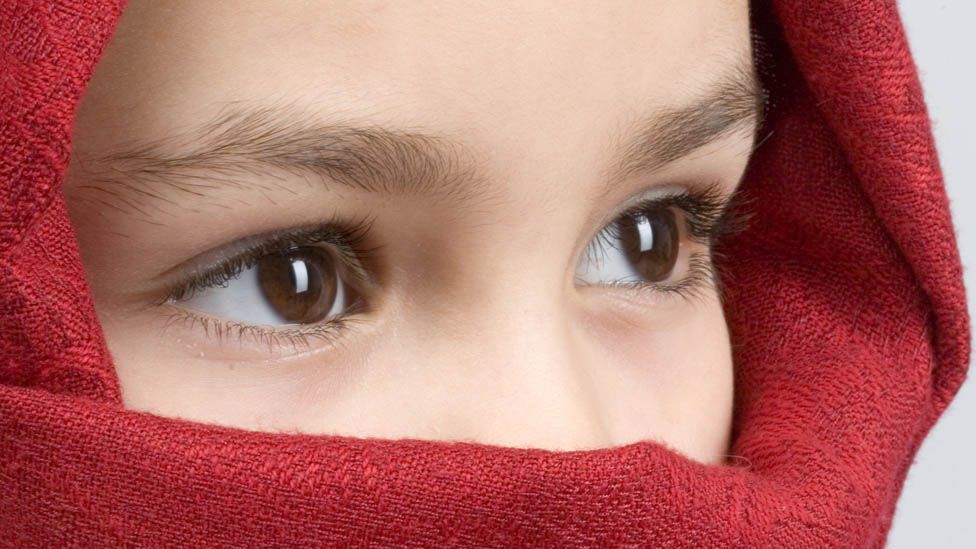Rescuing the lost children of IS
- Published

Tens of thousands of foreign fighters joined so-called Islamic State in Iraq and Syria - many of them from Russia. What has become of their families now the self-declared caliphate is crumbling?
In the breakfast room of Baghdad's grandest hotel, among the businessmen and official delegations, they look so out of place - four pale-faced children, aged between about three and six.
They're wolfing down their bowls of cereal with determination, but in silence. You can tell they're not on a family holiday. There are two women sitting with them, one nursing a small baby. But unlike the children, the women look Iraqi - and the body language is strangely distant. The children seem lost, mistrustful.
Suddenly, several important-looking men in suits at the next table glance at their watches. They stand up and motion to the women and children - who hurry off behind them as they stride down the hotel's marble-lined corridors.
Outside, two big cars are waiting. Security men in camouflage fatigues and dark glasses mutter into walkie-talkies as they hustle the children in, along with one of the women - they're hired nannies - who's holding the baby. The guards jump in too, the doors slam, and the cars head off in close convoy for the airport.
What I've been watching is Russia, its diplomats and intelligence agents - plucking some of its youngest citizens from the maelstrom of post-war Iraq - and taking them home.
They're three brothers and two sisters - and I'll see them again that evening, on Russian television, at the end of their journey, being led or carried down the steps of a plane by one of the men who was at the next table at breakfast.
Cameras flash, the children, looking completely dazed, are handed over to relatives wailing with joy, and the man - in his 50s, tall and imposing with a clipped white moustache but strangely soft, diffident face - struggles through an interview until he too is overcome by emotion.
His name is Ziyad Sabsabi - a Russian politician and official envoy to the Middle East of the president of Chechnya, Russia's southern, Muslim republic. Late the night before, I sat with him on a sofa at the hotel as he scrolled through pictures and videos on his phone - footage of the boys and girls in the Baghdad orphanage he'd taken them from - and of scores of other children, a few he's already rescued, many more still missing.
With me too, he breaks into tears as he talks about them.
They're the children of men who left their country to bring death and destruction to Iraq and Syria, volunteer fighters for so-called Islamic State, guilty of or complicit in horrific crimes.
But, as this weirdly unofficial-seeming official asks again and again, what have they, the children, done wrong?
Their mothers, he says - young Russian Muslim women - were usually tricked by their husbands into travelling to join IS. They apparently thought they were going on holiday, or to work, in Turkey - but were then taken across the border into Syria or Iraq.
Find out more
- Listen to Tim Whewell's documentary on the lost children of IS on BBC Radio 4's Crossing Continents at 11:00 GMT on Thursday 7 December
- Or catch up late on the BBC iPlayer
Now, with IS largely defeated on the battlefield, those husbands are mostly dead or imprisoned, their wives and children missing without trace. Hundreds of families of foreign IS fighters are detained in Iraq, but their names haven't all been disclosed yet, even to relatives.
Children like the ones I saw, who were taken to orphanages, whom Ziyad Sabsabi has been able to identify and get permission, after long negotiations, to repatriate - are the lucky ones.
As for the others, I've talked by phone to some of their grandmothers - middle-aged women in Chechnya desperate for news of daughters and grandchildren.
One is a woman I'll call Zamira. Her daughter Seda called her regularly for two and half years - first from Syria, where she was living with one fighter husband, and then, after he was killed, from Iraq where she lived with a second.
But as Iraqi forces advanced steadily towards the centre of Mosul, in July - and bombs rained down - the phone went silent. Since then, Zamira has had no idea whether her daughter, and two small grandchildren, are alive or dead.
Even now, she doesn't doubt her daughter's innocence. "Seda tried again and again to persuade her husband to come back," she insists. "But once they were there, they were trapped."
When Seda is found - if she is - the Russian state might not agree. Some repatriated IS widows have been arrested on arrival back home.
And yet Chechnya's repressive leader Ramzan Kadyrov insists it's a point of honour to bring back all children of the fatherland.
But the campaign may take years. In the Baghdad hotel he returns to on mission after mission, Kadyrov's envoy Sabsabi, scrolls on through the chain of angelic faces he's searching for - and wipes away another tear.